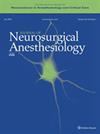吗啡预处理通过cPKCγ-NF-κB-cFLIPL途径缓解缺血/再灌注诱导的Caspase-8依赖性神经元凋亡
IF 2.3
2区 医学
Q2 ANESTHESIOLOGY
引用次数: 0
摘要
围手术期脑缺血/再灌注损伤是导致患者术后死亡和认知功能障碍的主要原因。据报道,吗啡预处理(MP)可以模拟缺血/缺氧预处理,保护缺血/再灌注损伤。然而,MP对缺血/再灌注诱导的神经细胞凋亡的作用机制尚未完全阐明。本文章由计算机程序翻译,如有差异,请以英文原文为准。
Morphine Preconditioning Alleviates Ischemia/Reperfusion-induced Caspase-8-dependent Neuronal Apoptosis through cPKCγ-NF-κB-cFLIPL Pathway.
Perioperative cerebral ischemia/reperfusion injury is a major contributor to postoperative death and cognitive dysfunction in patients. It was reported that morphine preconditioning (MP) can mimic ischemia/hypoxia preconditioning to protect against ischemia/reperfusion injury. However, the mechanism of MP on the ischemia/reperfusion-induced neuronal apoptosis has not been fully clarified.
求助全文
通过发布文献求助,成功后即可免费获取论文全文。
去求助
来源期刊
CiteScore
6.20
自引率
10.80%
发文量
119
审稿时长
>12 weeks
期刊介绍:
The Journal of Neurosurgical Anesthesiology (JNA) is a peer-reviewed publication directed to an audience of neuroanesthesiologists, neurosurgeons, neurosurgical monitoring specialists, neurosurgical support staff, and Neurosurgical Intensive Care Unit personnel. The journal publishes original peer-reviewed studies in the form of Clinical Investigations, Laboratory Investigations, Clinical Reports, Review Articles, Journal Club synopses of current literature from related journals, presentation of Points of View on controversial issues, Book Reviews, Correspondence, and Abstracts from affiliated neuroanesthesiology societies.
JNA is the Official Journal of the Society for Neuroscience in Anesthesiology and Critical Care, the Neuroanaesthesia and Critical Care Society of Great Britain and Ireland, the Association de Neuro-Anesthésiologie Réanimation de langue Française, the Wissenschaftlicher Arbeitskreis Neuroanästhesie der Deutschen Gesellschaft fur Anästhesiologie und Intensivmedizen, the Arbeitsgemeinschaft Deutschsprachiger Neuroanästhesisten und Neuro-Intensivmediziner, the Korean Society of Neuroanesthesia, the Japanese Society of Neuroanesthesia and Critical Care, the Neuroanesthesiology Chapter of the Colegio Mexicano de Anesthesiología, the Indian Society of Neuroanesthesiology and Critical Care, and the Thai Society for Neuroanesthesia.

 求助内容:
求助内容: 应助结果提醒方式:
应助结果提醒方式:


